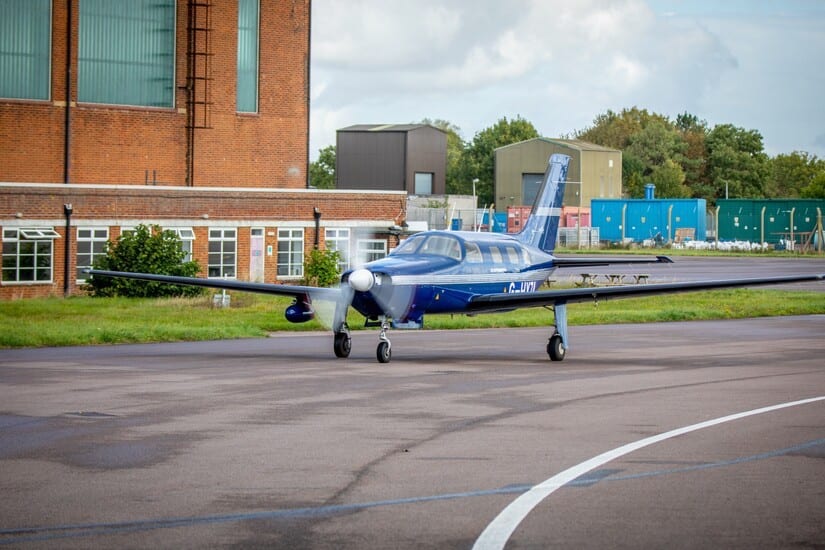
ZeroAvia has established a new partnership with British Airways and received a new round of funding from a number of companies that includes Amazon on its path to developing a zero-emission 19-seat aircraft by 2023. (ZeroAvia)
Shortly after British Airways announced a new partnership with hydrogen-powered aircraft startup ZeroAvia, Amazon joined a number of new investors backing their plan to develop a 19-seat zero-emission turboprop by 2023.
California-based ZeroAvia completed a series of test flights earlier this year with a Piper Malibu Mirage turboprop modified with a 300-kilowatt (kW) battery electric power system along with a customized cockpit display and computer. In a Dec. 16 press release, ZeroAvia confirmed $21.4 million in a new Series A round of funding lead by Breakthrough Energy Ventures and Ecosystem Integrity Fund.
Amazon Climate Pledge Fund, Horizons Ventures, Shell Ventures, and Summa Equity have also joined as follow-on investors. In addition, the U.K. government committed to $16.3 million in non-dilutive funding through its Aerospace Technology Institute (ATI) Program designed to increase the nation’s competitiveness in civil aerospace.
“Our most recent milestone achievements are closing the gap for the airline industry to begin its transition away from fossil fuels. In fact, over ten forward-looking airlines are now gearing up to implement our powertrains when they are ready in 2023,” Val Miftakhov, founder and CEO of ZeroAvia said in the release. “Both aviation and the financial markets are waking up to the idea that hydrogen is the only meaningful path towards large-scale, zero-emission commercial flight. Powering a 100-seat plane on hydrogen is not out of the question.”
According to ZeroAvia, the new funding will contribute to the next phase of their research and development to test a certification-ready version of their ZA-600 powertrain that is capable of 10-20 seat aircraft up to 500 miles. The new investors come following ZeroAvia’s completion of the U.K.’s first ever electric-powered flight of a commercial-scale aircraft in June, and the first hydrogen-fueled commercial-grade aircraft flight using their Piper M-class six-seater turboprop in September.
Both flights occurred at Cranfield Airport, where ZeroAvia’s research and development facility is located along with hydrogen production and refueling infrastructure created to offer a prototype of what a future hydrogen airport refueling system will look like.
“Amazon created The Climate Pledge Fund to support the development of technologies and services that will enable Amazon and other companies to reach the goals of the Paris Agreement ten years early—achieving net zero carbon by 2040,” said Kara Hurst, VP Worldwide Sustainability, Amazon. “ZeroAvia’s zero-emission aviation powertrain has real potential to help decarbonize the aviation sector, and we hope this investment will further accelerate the pace of innovation to enable zero-emission air transport at scale.”
The British Airways partnership with ZeroAvia is part of the International Airline Group’s (IAG) Hangar 51 technology accelerator program that is working to provide startups with the opportunity to develop future technologies that can be tested in real-world scenarios. Under the partnership, ZeroAvia’s team will work remotely alongside mentors and experts from the airline to address challenges associated with integrating fossil fuels and zero-emission hydrogen into their future fleet.
“British Airways is committed to a sustainable future and achieving net-zero carbon emissions by 2050. In the short-term this means improving our operational efficiency and introducing carbon offset and removal projects, while in the medium to longer-term we’re investing in the development of sustainable aviation fuel and looking at how we can help accelerate the growth of new technologies such as zero-emissions hydrogen-powered aircraft,” Sean Doyle, CEO of British Airways, said in a Dec. 12 press release.
In 2021, ZeroAvia expects to further demonstrate the credibility of its technology at longer ranges with larger aircraft. Beyond 2023, by 2027 ZeroAvia wants to have power plans in service capable of powering commercial flights of over 500-miles operated by aircraft with up to 100 seats.